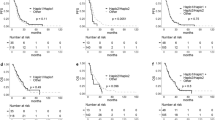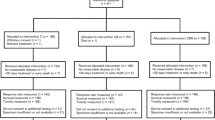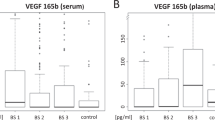Abstract
The aim of the study was to evaluate the association of vascular endothelial growth factor (VEGF) genotypes with treatment efficacy in a phase II trial. This study evaluated weekly docetaxel, as first-line treatment for metastatic breast cancer. Existing data from in vitro and animal model experiments suggest that docetaxel at low doses has anti-angiogenic activity. DNA was extracted from blood samples of 86 patients participating in the trial. Genotyping was performed for selected single-nucleotide polymorphisms (SNPs; VEGF−2578, −1498, −1154, and +936). Moreover, due to the highly polymorphic nature of the studied areas, we were able to analyze additional registered SNPs. All candidate genotypes were evaluated for associations with overall survival (OS), progression-free survival (PFS) and response rate. The VEGF−1154 GG genotype was more frequent in patients not responding to treatment compared with responders (42.9% vs 0.0%, P=0.048). Moreover, the VEGF−2578 AA genotype was associated with longer PFS compared with CC (hazard ratio (HR)=0.40; 95% confidence interval (CI) 0.17–0.98; pairwise P=0.0457). Patients with the VEGF−1190 GG genotype demonstrated shorter PFS compared with those with the alternative genotypes (GA and AA) combined (HR=3.85; 95% CI: 1.20–12.50; P=0.0224). In addition, the VEGF−2551/−2534 homozygous del18bp and VEGF−2430/−2425 homozygous ins1bp genotypes were associated with worse PFS compared with no deletion and no insertion, respectively (HR=2.49; 95% CI: 1.02–6.07; pairwise P=0.0442 and HR=2.57; 95% CI: 1.05–6.27; pairwise P=0.0385, respectively). Furthermore, patients with the VEGF−1498 CC genotype exhibited longer median OS compared with those with the alternatives genotypes (CT and TT) combined (HR=0.27; 95% CI: 0.08–0.89; P=0.0311). In multivariate analysis, the VEGF−2578 AA genotype retained its significance (P=0.0220) for PFS. Our results support the association of specific VEGF genotypes with clinical outcome in patients with metastatic breast cancer treated with a potentially anti-angiogenic regimen, such as weekly docetaxel. However, current results should be validated prospectively in larger cohorts.
This is a preview of subscription content, access via your institution
Access options
Subscribe to this journal
Receive 6 print issues and online access
$259.00 per year
only $43.17 per issue
Buy this article
- Purchase on Springer Link
- Instant access to full article PDF
Prices may be subject to local taxes which are calculated during checkout





Similar content being viewed by others
References
Folkman J . Angiogenesis in cancer, vascular, rheumatoid and other disease. Nat Med 1996; 1: 27–31.
Ferrara N . VEGF and the quest for tumour angiogenesis factors. Nat Rev Cancer 2002; 2: 795–803.
Hicklin DJ, Ellis LM . Role of the vascular endothelial growth factor pathway in tumor growth and angiogenesis. J Clin Oncol 2005; 23: 1011–1027.
Shibuya M, Claesson-Welsh L . Signal transduction by VEGF receptors in regulation of angiogenesis and lymphangiogenesis. Exp Cell Res 2006; 312: 549–560.
Kerbel RS . Tumor angiogenesis. N Engl J Med 2008; 358: 2039–2049.
Rivera E, Mejia JA, Arun BK, Adinin RB, Walters RS, Brewster A et al. Phase 3 study comparing the use of docetaxel on an every-3-week versus weekly schedule in the treatment of metastatic breast cancer. Cancer 2008; 112: 1455–1461.
Sparano JA, Wang M, Martino S, Jones V, Perez EA, Saphner T et al. Weekly paclitaxel in the adjuvant treatment of breast cancer. N Engl J Med 2008; 358: 1663–1671.
Kamat AA, Kim TJ, Landen CN Jr, Lu C, Han LY, Lin YG et al. Metronomic chemotherapy enhances the efficacy of antivascular therapy in ovarian cancer. Cancer Res 2007; 67: 281–288.
Benelli R, Monteghirfo S, Balbi C, Barboro P, Ferrari N . Novel antivascular efficacy of metronomic docetaxel therapy in prostate cancer: hnRNP K as a player. Int J Cancer 2009; 124: 2989–2996.
Pectasides D, Papaxoinis G, Kotoula V, Fountzilas H, Korantzis I, Koutras A et al. Expression of angiogenic markers in the peripheral blood of docetaxel-treated advanced breast cancer patients: a Hellenic Cooperative Oncology Group (HeCOG) study. Oncol Rep 2012; 27: 216–224 doi: 10.3892/or.2011.1504.
Schneider BP, Wang M, Radovich M, Sledge GW, Badve S, Thor A et al. Association of vascular endothelial growth factor and vascular endothelial growth factor receptor-2 genetic polymorphisms with outcome in a trial of paclitaxel compared with paclitaxel plus bevacizumab in advanced breast cancer: ECOG 2100. J Clin Oncol 2008; 26: 4672–4678.
Simon RM, Paik S, Hayes DF . Use of archived specimens in evaluation of prognostic and predictive biomarkers. J Natl Cancer Inst 2009; 101: 1446–1452.
McShane LM, Altman DG, Sauerbrei W, Taube SE, Gion M, Clark GM . REporting recommendations for tumor MARKer prognostic studies (REMARK). Breast Cancer Res Treat 2006; 100: 229–235.
Jain L, Vargo CA, Danesi R, Sissung TM, Price DK, Venzon D et al. The role of vascular endothelial growth factor SNPs as predictive and prognostic markers for major solid tumors. Mol Cancer Ther 2009; 8: 2496–2508.
Schneider BP, Radovich M, Miller KD . The role of vascular endothelial growth factor genetic variability in cancer. Clin Cancer Res 2009; 15: 5297–5302.
Koutras AK, Antonacopoulou AG, Eleftheraki AG, Dimitrakopoulos FI, Koumarianou A, Varthalitis I et al. Vascular endothelial growth factor polymorphisms and clinical outcome in colorectal cancer patients treated with irinotecan-based chemotherapy and bevacizumab. Pharmacogenomics J 2012; 12: 468–475 doi: 10.1038/tpj.2011.37.
Mohammadi M, Ollier W . Hutchinson IV. A functional association study of VEGF gene promoter polymorphisms with VEGF expression by stimulated pbm cells. Hum Immunol 2003; 64: S125.
Jacobs EJ, Feigelson HS, Bain EB, Brady KA, Rodriguez C, Stevens VL et al. Polymorphisms in the vascular endothelial growth factor gene and breast cancer in the Cancer Prevention Study II cohort. Breast Cancer Res 2006; 8: R22.
Jin Q, Hemminki K, Enquist K, Lenner P, Grzybowska E, Klaes R et al. Vascular endothelial growth factor polymorphisms in relation to breast cancer development and prognosis. Clin Cancer Res 2005; 11: 3647–3653.
Lu H, Shu XO, Cui Y, Kataoka N, Wen W, Cai Q et al. Association of genetic polymorphisms in the VEGF gene with breast cancer survival. Cancer Res 2005; 65: 5015–5019.
Fukuda H, Tsuchiya N, Narita S, Kumazawa T, Horikawa Y, Inoue T et al. Clinical implication of vascular endothelial growth factor T-460C polymorphism in the risk and progression of prostate cancer. Oncol Rep 2007; 18: 1155–1163.
Burstein HJ, Chen YH, Parker LM, Savoie J, Younger J, Kuter I et al. VEGF as a marker for outcome among advanced breast cancer patients receiving anti-VEGF therapy with bevacizumab and vinorelbine chemotherapy. Clin Cancer Res 2008; 14: 7871–7877.
Gianni L, Romieu G, Lichinitser M, Serrano S, Mansutti M, Pivot X et al. First results of AVEREL, a randomized phase III trial to evaluate bevacizumab (BEV) in combination with trastuzumab (H)+docetaxel (DOC) as first-line therapy for HER2-positive locally recurrent/metastatic breast cancer (LR/mBC). San Antonio Breast Cancer Symposium 2011, Abstract S4–S8.
Miles DW, de Haas SL, Dirix LY, Romieu G, Chan A, Pivot X et al. Biomarker results from the AVADO phase 3 trial of first-line bevacizumab plus docetaxel for HER2-negative metastatic breast cancer. Br J Cancer 2013; 108: 1052–1060.
Schneider BP, Gray RJ, Radovich M, Shen F, Vance G, Li L et al. Prognostic and predictive value of tumor vascular endothelial growth factor gene amplification in metastatic breast cancer treated with paclitaxel with and without bevacizumab; results from ECOG 2100 trial. Clin Cancer Res 2013; 19: 1281–1289.
Schneider BP, Skaar TC, Sledge GW, Badve S, Li L, Flockhart DA . Analysis of angiogenesis genes from paraffin-embedded breast tumor and lymph nodes. Breast Cancer Res Treat 2006; 96: 209–215.
Coltelli L, Allegrini G, Orlandi P, Giuntini N, Alì G, Fioravanti A et al. Discordant somatic and germline VEGF-A genotype in a cancer patient resistant to paclitaxel/bevacizumab with chemosensitive hepatic metastasis. Pharmacogenomics 2009; 10: 1225–1229.
Author information
Authors and Affiliations
Corresponding author
Ethics declarations
Competing interests
The authors declare no conflict of interest.
Rights and permissions
About this article
Cite this article
Koutras, A., Kotoula, V., Papadimitriou, C. et al. Vascular endothelial growth factor polymorphisms and clinical outcome in patients with metastatic breast cancer treated with weekly docetaxel. Pharmacogenomics J 14, 248–255 (2014). https://doi.org/10.1038/tpj.2013.36
Received:
Revised:
Accepted:
Published:
Issue Date:
DOI: https://doi.org/10.1038/tpj.2013.36



